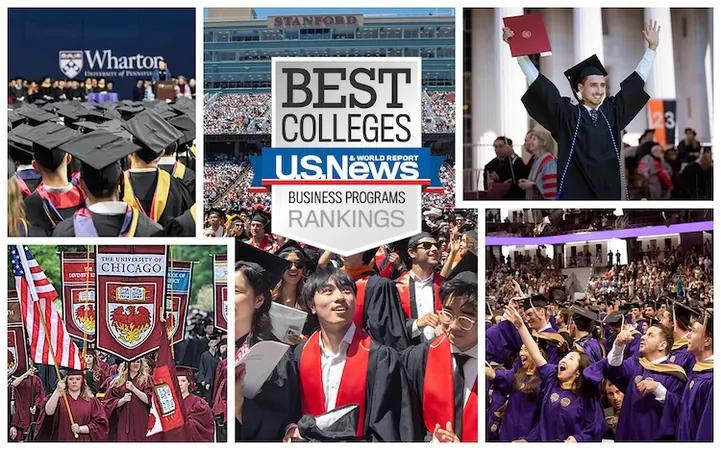
Wharton Dominates 2025 U.S. News MBA Rankings, Leaving Competitors Behind!
2025-04-08
Author: Ting
Wharton Dominates 2025 U.S. News MBA Rankings, Leaving Competitors Behind!
In a significant leap that sends shockwaves through the business education landscape, the Wharton School of the University of Pennsylvania has claimed the top spot in the 2025 U.S. News MBA rankings, as revealed today. After a tie with Stanford's Graduate School of Business last year, Wharton now stands alone at the pinnacle of business education excellence.
Stanford has dropped to a tie for second place with Northwestern University's Kellogg School of Management, while the University of Chicago's Booth School and MIT Sloan take the next positions, rounding out a competitive Top 5. Wharton’s resurgence underscores its continued allure to aspiring business leaders, solidifying its status as a premier institution for MBA education.
In a noteworthy development, Kellogg not only improved its position by one rank but also tied for first in the esteemed part-time MBA category alongside Chicago Booth and Berkeley Haas. Meanwhile, Harvard Business School, traditionally a frontrunner, maintains its sixth-place ranking but now shares that position with Dartmouth's Tuck School of Business and NYU's Stern School. Columbia Business School and Yale University’s School of Management complete the Top 10, demonstrating the fierce competition among America's elite business schools.
When looking beyond the top tier, there were notable shifts within the Top 25. Ohio State University's Fisher School of Business propelled itself upwards by seven places to rank 24th, while the University of Washington's Foster School of Business climbed five spots to reach 22nd. Conversely, the Marshall School at the University of Southern California tumbled six places to 24th, and the University of North Carolina's Kenan-Flagler Business School fell eight spots, landing outside the Top 25 at 28th.
MBA Rankings: The Reality Behind the Numbers
The U.S. News MBA rankings continue to impact how business schools are perceived, creating a love/hate dynamic among deans across the nation. A recent survey conducted by Poets&Quants, in collaboration with the Herbert College of Business at the University of Miami, reveals that nearly three-quarters of deans believe the U.S. News ranking is crucial in shaping school quality attitudes—far more influential than its Financial Times counterpart.
Among the wider landscape, American University’s Kogod School of Business saw a remarkable rise, jumping 27 places to 58th, while the University of Arkansas's Walton College rose 24 spots to 50th. However, the single largest drop was recorded by Indiana University’s Indianapolis MBA program, plummeting 29 places to tie for 100th with Loyola Marymount University.
Twentytwo schools experienced double-digit shifts this year, raising questions about the reliability of these rankings. The volatility can be attributed to various factors, often disproportionately affecting smaller programs, leading to skepticism about how effectively the U.S. News rankings evaluate diverse institutions.
Analyzing What Counts: The Metrics Behind Rankings
The components influencing a school's ranking are critical to understanding how and why they place where they do. Notably, metrics such as yield—reflecting the percentage of accepted applicants who choose to enroll—along with endowment size, greatly impact schools like Harvard, which boasts an unprecedented endowment of 5.4 billion dollars. Such attributes significantly enhance recruitment capabilities for faculty and students alike.
For the current rankings, half of the evaluation stems from placement success and starting salaries. U.S. News allocates substantial weight to employment rates and average salaries, with Harvard’s recent starting pay of $193,505 lagging behind Stanford’s impressive $206,955.
The remaining half of the ranking relies on student selectivity and responses from academic peers as well as corporate recruiters. When compared against metrics like GMAT scores, enrollment rates, and GPA, these factors continue to illustrate why some institutions remain at the summit while others struggle to maintain or improve their standing.
As the dust settles on this year's rankings, one thing remains clear: the battle for supremacy among the nation’s business schools is as fierce as ever, with Wharton leading the charge toward an unpredictable future. Will other institutions rise to challenge them? Only time will tell in this high-stakes educational arena!



 Brasil (PT)
Brasil (PT)
 Canada (EN)
Canada (EN)
 Chile (ES)
Chile (ES)
 Česko (CS)
Česko (CS)
 대한민국 (KO)
대한민국 (KO)
 España (ES)
España (ES)
 France (FR)
France (FR)
 Hong Kong (EN)
Hong Kong (EN)
 Italia (IT)
Italia (IT)
 日本 (JA)
日本 (JA)
 Magyarország (HU)
Magyarország (HU)
 Norge (NO)
Norge (NO)
 Polska (PL)
Polska (PL)
 Schweiz (DE)
Schweiz (DE)
 Singapore (EN)
Singapore (EN)
 Sverige (SV)
Sverige (SV)
 Suomi (FI)
Suomi (FI)
 Türkiye (TR)
Türkiye (TR)
 الإمارات العربية المتحدة (AR)
الإمارات العربية المتحدة (AR)